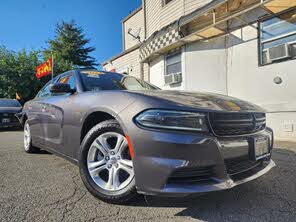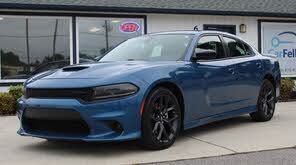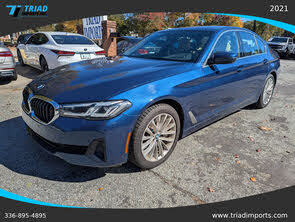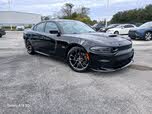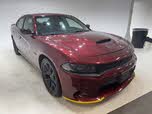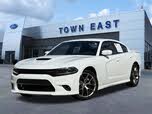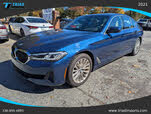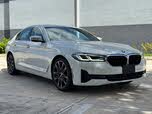2022 Dodge Charger vs 2021 BMW 5 Series
Overview | |
MSRP$54,200 | MSRP$32,500 |
Listings276 | Listings1577 |
Ratings & Reviews | |
User Reviews | User Reviews |
Expert reviews8.0 out of 10 | Expert reviews8.0 out of 10 |
Pros
Cons
| Pros
Cons
|
2021 BMW 5 Series Reviews SummaryBMW was once known for sports sedans, and the 5 Series was one of the most prolific of those sedans. Sitting between the 3 Series and 7 Series in size and price, previous generations of 5 Series were known for a balance of performance and luxury, with impeccable engineering throughout. Today, the BMW 5 Series is largely irrelevant. The 3 Series is now so big that there is less reason to upgrade, and most buyers are more interested in SUVs anyway. The competition—including the Audi A6, Jaguar XF, Mercedes-Benz E-Class, and Volvo S90—has also gotten better. That doesn’t mean BMW has given up on the 5 Series. The current generation (codename G30) arrived for the 2017 model year, but it gets a midcycle refresh (or LCI, short for “Life Cycle Impulse,” in BMW speak) for 2021. Major updates include a 48-volt mild-hybrid system, a bigger infotainment touchscreen, and subtle styling changes. The 2021 BMW 5 Series is not like the 5 Series models of old. That may drive away hardcore car fans, but the 2021 model makes a strong case to new-car buyers, maintaining sportier-than-average driving dynamics, along with the tech and luxury features expected of a car in this segment. | |
2022 Dodge Charger Reviews SummaryA living fossil is an animal that exists today that resembles a long-extinct species. There are a number of sharks and mollusks that fit this description. And the same could be said for the 2022 Dodge Charger. It has muscular proportions, a similar layout, and an identical name to long-dead forebears, but it carries on in its own way—despite the veracity of any shared DNA. Given how much the auto industry is changing, the Charger is an unlikely car for this decade—or even this century. But perhaps not. As much as the industry is rapidly evolving, buyer behavior might not be so quick to change. For every electric vehicle enthusiast, there are those who truly wish to stick to their guns when it comes to traditional gas vehicles. And certainly many lament the dwindling light of the big, thirsty muscle car. Whether it be nostalgia or a more timeless form of automotive enthusiasm, the Dodge Charger clearly hit a nerve with many over the past two decades. Whether you prefer electric cars, hybrids, 4x4s, or even mass transit, it’s hard to argue the fact that the automotive world is just a better place with cars like the Dodge Charger in it. | |
No video found | No video found |
Popular Features & Specs | |
Engine2.0L 248 hp I4 | Engine3.6L 292 hp V6 |
Drive TrainRWD | Drive TrainRWD |
Seating Capacity5 | Seating Capacity5 |
Horsepower248 hp @ 5200 rpm | Horsepower292 hp @ 6350 rpm |
MPG City25 | MPG City19 |
MPG Highway33 | MPG Highway30 |
Engine | |
Engine Name2.0L 248 hp I4 | Engine Name3.6L 292 hp V6 |
Torque257 lb-ft @ 1500 rpm | Torque260 lb-ft @ 4800 rpm |
Horsepower248 hp @ 5200 rpm | Horsepower292 hp @ 6350 rpm |
DrivetrainRWD | DrivetrainRWD |
Fuel Economy | |
MPG City25 | MPG City19 |
MPG Highway33 | MPG Highway30 |
Interior | |
Seating Capacity5 | Seating Capacity5 |
Key Features | |
Navigation SystemStandard | Navigation System |
Sunroof/MoonroofStandard | Sunroof/Moonroof |
Safety | |
Front Crash Overall | Front Crash Overall4 |
Side Crash Overall | Side Crash Overall5 |
Dimensions & Capacity | |
Cargo Space14.0 cu ft | Cargo Space16.5 cu ft |
Curb Weight3765 lbs | Curb Weight3940 lbs |
Height58.2 in | Height57.8 in |
Length195.8 in | Length198.4 in |
Width83.7 in | Width82.7 in |
Wheelbase117.1 in | Wheelbase120.0 in |
Maximum Payload800 lbs | Maximum Payload1160 lbs |
Number of doors4 | Number of doors4 |
Maximum Towing Capacity | Maximum Towing Capacity1000 lbs |
Overview | ||
MSRP | $54,200 | $32,500 |
Listings | ||
Ratings & Reviews | ||
User reviews | ||
Expert reviews | 8.0 out of 10Read full review | 8.0 out of 10Read full review |
Pros & cons | Pros
Cons
| Pros
Cons
|
Summary | BMW was once known for sports sedans, and the 5 Series was one of the most prolific of those sedans. Sitting between the 3 Series and 7 Series in size and price, previous generations of 5 Series were known for a balance of performance and luxury, with impeccable engineering throughout. Today, the BMW 5 Series is largely irrelevant. The 3 Series is now so big that there is less reason to upgrade, and most buyers are more interested in SUVs anyway. The competition—including the Audi A6, Jaguar XF, Mercedes-Benz E-Class, and Volvo S90—has also gotten better. That doesn’t mean BMW has given up on the 5 Series. The current generation (codename G30) arrived for the 2017 model year, but it gets a midcycle refresh (or LCI, short for “Life Cycle Impulse,” in BMW speak) for 2021. Major updates include a 48-volt mild-hybrid system, a bigger infotainment touchscreen, and subtle styling changes. The 2021 BMW 5 Series is not like the 5 Series models of old. That may drive away hardcore car fans, but the 2021 model makes a strong case to new-car buyers, maintaining sportier-than-average driving dynamics, along with the tech and luxury features expected of a car in this segment. | A living fossil is an animal that exists today that resembles a long-extinct species. There are a number of sharks and mollusks that fit this description. And the same could be said for the 2022 Dodge Charger. It has muscular proportions, a similar layout, and an identical name to long-dead forebears, but it carries on in its own way—despite the veracity of any shared DNA. Given how much the auto industry is changing, the Charger is an unlikely car for this decade—or even this century. But perhaps not. As much as the industry is rapidly evolving, buyer behavior might not be so quick to change. For every electric vehicle enthusiast, there are those who truly wish to stick to their guns when it comes to traditional gas vehicles. And certainly many lament the dwindling light of the big, thirsty muscle car. Whether it be nostalgia or a more timeless form of automotive enthusiasm, the Dodge Charger clearly hit a nerve with many over the past two decades. Whether you prefer electric cars, hybrids, 4x4s, or even mass transit, it’s hard to argue the fact that the automotive world is just a better place with cars like the Dodge Charger in it. |
Video | No video found | No video found |
Popular Features & Specs | ||
Engine | 2.0L 248 hp I4 | 3.6L 292 hp V6 |
Drive Train | RWD | RWD |
Seating Capacity | 5 | 5 |
Horsepower | 248 hp @ 5200 rpm | 292 hp @ 6350 rpm |
MPG City | 25 | 19 |
MPG Highway | 33 | 30 |
Engine | ||
Engine Name | 2.0L 248 hp I4 | 3.6L 292 hp V6 |
Torque | 257 lb-ft @ 1500 rpm | 260 lb-ft @ 4800 rpm |
Horsepower | 248 hp @ 5200 rpm | 292 hp @ 6350 rpm |
Drivetrain | RWD | RWD |
Fuel Economy | ||
MPG City | 25 | 19 |
MPG Highway | 33 | 30 |
Interior | ||
Seating Capacity | 5 | 5 |
Key Features | ||
Navigation System | Standard | |
Sunroof/Moonroof | Standard | |
Safety | ||
Front Crash Overall | 4 | |
Side Crash Overall | 5 | |
Dimensions & Capacity | ||
Cargo Space | 14.0 cu ft | 16.5 cu ft |
Curb Weight | 3765 lbs | 3940 lbs |
Height | 58.2 in | 57.8 in |
Length | 195.8 in | 198.4 in |
Width | 83.7 in | 82.7 in |
Wheelbase | 117.1 in | 120.0 in |
Maximum Payload | 800 lbs | 1160 lbs |
Number of doors | 4 | 4 |
Maximum Towing Capacity | 1000 lbs | |
The 2021 BMW 5 Series had a restrained design, lacking the flourishes of the 3 Series and the imposing size of the 7 Series. It received a minor styling refresh, including streamlined LED headlights and a larger twin-kidney grille. The M Sport Package added trapezoidal tailpipes, L-shaped taillights, and new bumpers. The interior retained the familiar BMW layout, with specific design elements like the touchscreen positioning and shifter typefaces. Lower trims featured SensaTec upholstery, while higher trims offered Dakota and Nappa leather. The aluminum trim added a high-end feel, but the sport steering wheel felt out of place.
The 2022 Dodge Charger, running on a platform dating back to 2005, had a modern and menacing design. Despite updates, the cabin felt dated with thick bezels and chunky buttons. The SXT trim came with a V6 engine, power-adjustable front seats, and a 7-inch touchscreen. Higher trims like the GT added a rear spoiler and sport-tuned suspension. The R/T trim introduced a V8 engine, while the R/T Scat Pack featured a larger V8 and performance enhancements. The Hellcat Widebody, with a supercharged V8, offered a well-rounded performance machine. The Redeye and Jailbreak trims pushed power output even further.

















The 2021 BMW 5 Series offered a range of powertrains. The base 530i had a 2.0-liter turbocharged four-cylinder engine with 248 horsepower and 258 pound-feet of torque, achieving 0-60 mph in 5.9 seconds. The 540i featured a 3.0-liter turbocharged inline-six engine with a 48-volt mild hybrid system, producing 335 hp and 362 lb-ft of torque, reaching 0-60 mph in 4.9 seconds. The M550i xDrive had a 4.4-liter twin-turbo V8 with 532 hp and 553 lb-ft of torque, while the M5 boasted 617 hp, achieving 0-60 mph in 3.1 seconds. The 530e plug-in hybrid combined a 2.0-liter engine with an electric motor, producing 288 hp and 310 lb-ft of torque, with a 0-60 mph time of 5.7 seconds.
The 2022 Dodge Charger SXT and GT models used a 3.6-liter V6 engine, producing 292 hp and 260 lb-ft of torque in base form, and 300 hp and 264 lb-ft in AWD trims. The R/T trim had a 5.7-liter Hemi V8 with 370 hp and 394 lb-ft of torque. The R/T Scat Pack featured a 6.4-liter Hemi V8 with 485 hp and 475 lb-ft of torque. The Hellcat had a supercharged 6.2-liter Hemi V8 with 717 hp and 650 lb-ft of torque. The Redeye and Jailbreak trims pushed power to 797 hp and 807 hp, respectively. All engines used an eight-speed automatic transmission, with RWD standard and AWD available on V6 models. The Hellcat and Redeye achieved 0-60 mph in 3.6 seconds, with a top speed of 196 mph.
The 2021 BMW 5 Series, available only as a four-door sedan in the U.S., offered spacious front seats and adequate rear-seat room. The trunk had 14.0 cubic feet of space, with a 40/20/20 split-folding rear bench. The test car featured 16-way power front seats with heating and ventilation. Forward visibility was poor, but a surround-view camera system helped with maneuvering.
The 2022 Dodge Charger, a large sedan, had a high center console and performance bucket seats, creating an intimate front-seat experience. Both rows offered ample legroom, but headroom was limited. The rear seats were tight on headroom, especially when entering and exiting. The Charger provided 16.5 cubic feet of trunk space, but the small trunk lid and high rear bumper made loading large items challenging. Despite this, the Charger offered sports-car performance with four doors and a usable trunk.
The 2021 BMW 5 Series featured a standard 12.3-inch infotainment touchscreen with iDrive 7 and a 12.3-inch digital instrument cluster. Standard features included Apple CarPlay/Android Auto, Bluetooth, SiriusXM 360L, and a WiFi hotspot. The infotainment screen's location made it easy to read, but the instrument cluster layout could be confusing. The rotary knob controller provided a tactile feel, and voice control responded to "Hey BMW." Gesture controls were available but less precise than traditional knobs.
The 2022 Dodge Charger came standard with a 7-inch touchscreen running the Uconnect infotainment system, known for its ease of use. The layout included a dock area with large icons for major functions. An 8.4-inch version was optional on the base SXT and standard on higher trims. Both screens included Apple CarPlay and Android Auto. While not the most advanced, the Charger's technology blended well with conventional controls, offering a user-friendly experience.
The 2021 BMW 5 Series received a "Top Safety Pick+" award from the IIHS for the 2020 model, with top scores in all crash tests and front-crash prevention tests. Standard safety features included lane-departure warning, automatic emergency braking, blind-spot monitoring, and automatic high beams. The Driving Assistance Plus Package added adaptive cruise control, traffic-jam assist, lane-keep assist, and emergency stop assist. The driver-assist tech was sophisticated and smooth in operation.
The 2022 Dodge Charger offered only a backup camera and rear parking sensors as standard safety features. Optional features included forward-collision avoidance, automatic emergency braking, adaptive cruise control, lane-departure warning, lane-keep assist, rain-sensing wipers, blind-spot monitoring, and rear cross-traffic alert. The backup camera displayed a grainy image, highlighting the Charger's aging safety technology.
CarGurus highlights
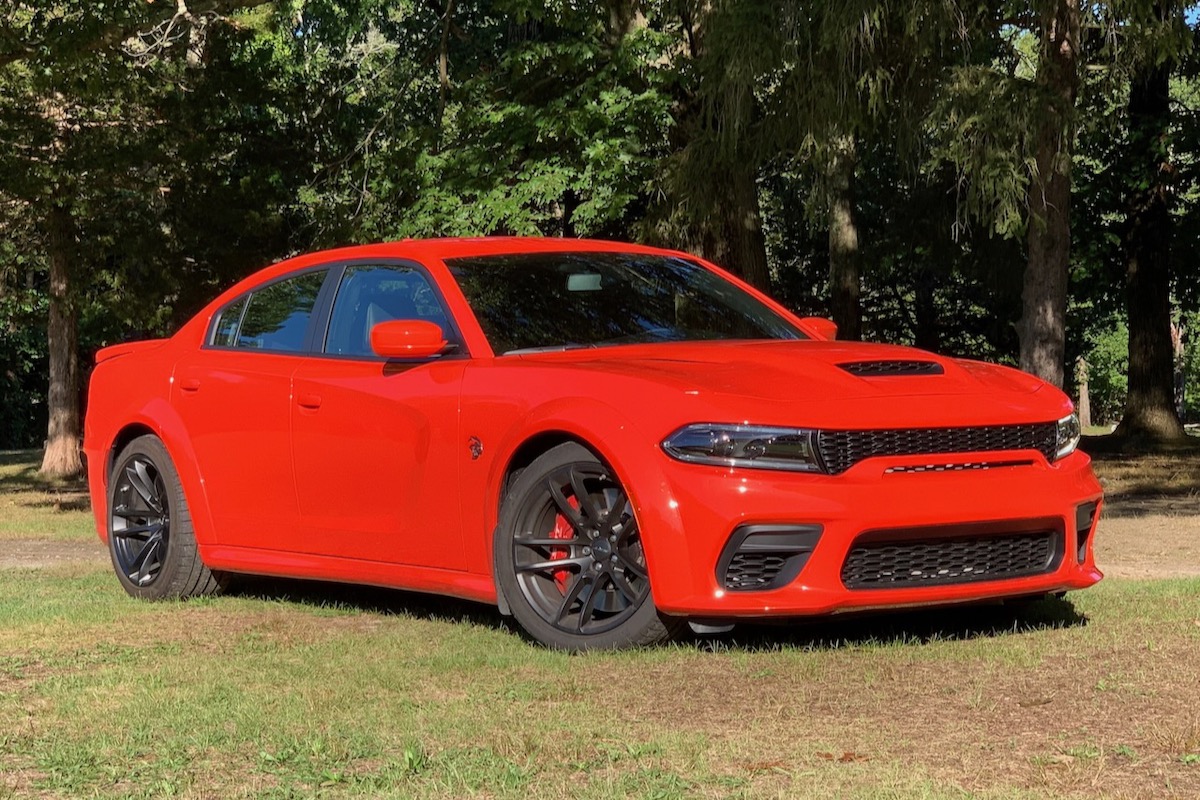
According to CarGurus experts, the overall rating for the 2021 BMW 5 Series is 8.0 out of 10, while the 2022 Dodge Charger scores 8.0 out of 10. Based on these ratings, the final recommendation is to choose the 2021 BMW 5 Series for its sophisticated driver-assist technology, range of powertrain options, and luxurious interior.
Choose the 2022 Dodge Charger if:
- You seek high-performance V8 engines with supercar-level power.
- You need a versatile sedan with sports-car performance and a usable trunk.
- You value a user-friendly infotainment system with conventional controls.
Choose the 2021 BMW 5 Series if:
- You prioritize a sophisticated and smooth driver-assist technology.
- You want a range of powertrain options, including a plug-in hybrid.
- You prefer a spacious and luxurious interior with high-end materials.
CarGurus highlights

According to CarGurus experts, the overall rating for the 2021 BMW 5 Series is 8.0 out of 10, while the 2022 Dodge Charger scores 8.0 out of 10. Based on these ratings, the final recommendation is to choose the 2021 BMW 5 Series for its sophisticated driver-assist technology, range of powertrain options, and luxurious interior.
Choose the 2022 Dodge Charger if:
Shop Now- You seek high-performance V8 engines with supercar-level power.
- You need a versatile sedan with sports-car performance and a usable trunk.
- You value a user-friendly infotainment system with conventional controls.
Choose the 2021 BMW 5 Series if:
Shop Now- You prioritize a sophisticated and smooth driver-assist technology.
- You want a range of powertrain options, including a plug-in hybrid.
- You prefer a spacious and luxurious interior with high-end materials.

By: CarGurus + AI
At CarGurus, our team of experienced automotive writers remain at the heart of our content operation, conducting hands-on car tests and writing insightful guides that are backed by years of industry experience. To complement this, we are harnessing AI to make our content offering more diverse and more helpful to shoppers than ever. To achieve this, our AI systems are based exclusively on CarGurus content, ratings and data, so that what we produce is both unique to CarGurus, and uniquely helpful to car shoppers.




